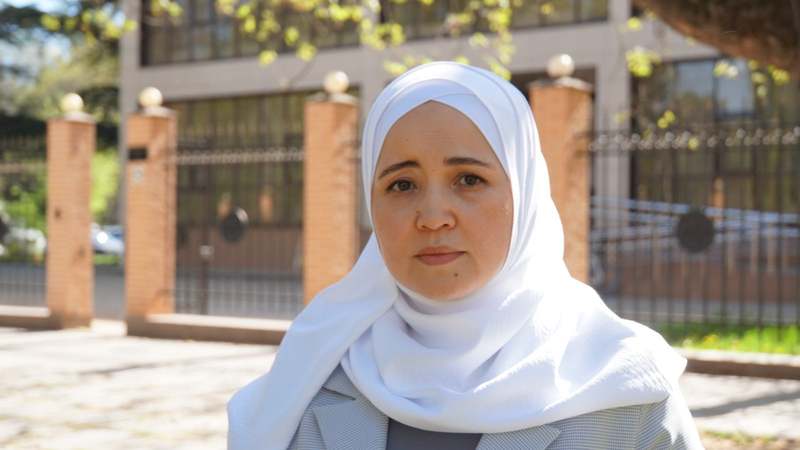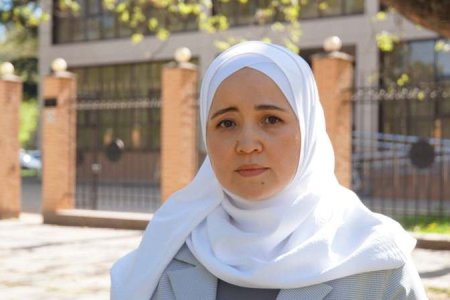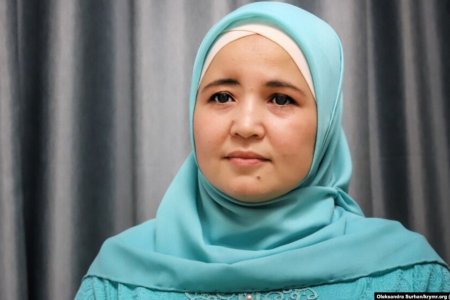
Two Russian-controlled ‘courts’ have recently upheld the ‘foreign agent’ label forcibly imposed upon Lutfiye Zudiyeva and fined the renowned Crimean Tatar journalist and human rights defender for supposed infringement of the rules this repressive label imposes. Both moves are part of a pronounced escalation in repression against Zudiyeva, with it especially worrying given the measures Russia has previously used, including massive prison sentences, to silence a number of Crimean Solidarity civic journalists.
Russia’s justice ministry added Lutfiye Zudiyeva to its notorious and rapidly expanding register of so-called ‘foreign agents’ on 16 May 2025. It claimed that she had “circulated false information about decisions taken by the public authorities of the Russian Federation and the policies they carry out”; that she was “under foreign influence” and “involved in political activities.”
Russia defines ‘false information’ as being that which clashes with the official propaganda narrative. Lutfiye Zudiyeva reports only the truth about political and religious persecution, as well as other violations of human rights in occupied Crimea. She firmly rejected from the outset any suggestion that her journalist and human rights activism were somehow dictated by ‘foreign influence’. She had, she said, reached all decisions, including on the need to speak out, independently, heeding the voice of her own conscience.
Russia has imprisoned many Crimean Solidarity civic journalists, such as Server Mustafayev, Remzi Bekirov, Osman Arifmemetov, and is trying to silence Lutfiye Zudiyeva precisely because it does not want the truth told about its repression. It was the influence that she and other courageous voices, speaking out for victims of persecution, had beyond Crimea that Russia wanted to stop – her articles for the independent Ukrainian publication Graty, and her interviews to international media and human rights organizations (CNN; Newsweek; the Committee to Protect Journalists and others). It is unclear why the Russian justice ministry specifically ‘accused her’ of being a member of Front Line Defenders, but that human rights organization and others were, certainly, following both her reports and the mounting pressure being brought to bear against her.
Lutfiye immediately lodged an appeal against the Russian justice ministry’s decision. This, it transpired almost a month later, had been ‘examined’ and, predictably’ rejected on 11 August by ‘judge’ Iryna Kozlova from the Zamoskvoretsky district court in Moscow.
On 25 August, Lutfiye received a summons to appear on 27 August at the Crimean occupation office of Russia’s justice ministry for administrative charges to be laid under Article 19.34 § 1 of Russia’s code of administrative offences (‘infringement on regulations for the activities of a foreign agent’.
The hearing into that administrative prosecution took place on 15 September 2025, with ‘judge’ Yelena Petrovna Nikolaeva from the occupation ‘Dzhankoi district court’ fining Lutfiye Zudiyeva 30 thousand roubles. This ruling will, of course, be appealed.
Both in her written statement to the court in Moscow and before the occupation ‘court’ in Dzhankoi, Lutfiye rejected the justice ministry’s assertion that her civic and media activities were ‘political’ and insisted that they should not be treated as falling under the force of Russia’s law on ‘foreign agents’.
No evidence had been produced of any ‘foreign influence’ brought to bear on her, and the law on ‘foreign agents’ itself, she said, was imprecise and could be used by the authorities as they wished.
On 15 September, she stated in ‘court’: “I view the present administrative protocol and the hearing as a continuation of the pressure which has been placed on me over several years because of my civic and information activities. I cover violations of other people’s human rights. They want only one thing from me – quite simply, that I stop talking about this. For me that is impossible since, in the first instance, this is linked with my personal convictions.” She added that her work as a journalist and human rights defender were prompted by her inner voice, her conscience.
The onerous demands under the law on ‘foreign agents’, and this first administrative prosecution, Lutfiye added, violated her right to freedom of expression. There had been no infringement of the law in her activities and she asked that the case be dropped.
“I cannot calmly sit and watch as the multiple searches which take place all the time in Crimea result in children being deprived of their fathers; in elderly parents being left without their children, without care, and in women remaining without their husbands. I believe that it is my right to have the possibility of speaking publicly about this. And this is the least I can do as a member of society.”
As reported, Russia’s persecution of Lutfiye Zudiyeva began back in 2019, two months after Russia’s most open attack on Crimean Solidarity with the arrests and subsequent huge sentences against 25 Crimean Tatar civic journalists and activists. On 30 May 2019, she was detained, together with Mumine Saliyeva, another Crimean Solidarity human rights activist and wife of political prisoner Seiran Saliyev. The detention of two women, both of whom have young children, seemed a clear threat that women could also become direct targets of repression. On that occasion, she was held prisoner for several hours, with lawyers prevented from seeing her. She was then brought before an occupation ‘court’ and fined over three Facebook posts which she had nothing to do with, but which somebody else had tagged her on when posting five years earlier.
On 27 July 2023, Zudiyeva and another journalist were illegally detained, together with 12 other Crimean Tatars for trying to attend a purportedly open court hearing into the appeal against the appalling sentences passed on Crimean Tatar Mejlis leader, journalist and human rights defender Nariman Dzhelyal and two cousins, Asan and Aziz Akhtemov. She was fined on a preposterous charge of having taken part in an unauthorized mass event, with the occupation ‘judge’, like the Russian-controlled ‘police’, ignoring the fact that she had been there as a journalist.
On 22 February 2024, armed Russian enforcement officers burst into Zudiyeva’s home in Dzhankoi, carried out a search for which they did not have a proper warrant, and took Lutfiye to the Simferopol department of the ‘centre for countering extremism’ where two administrative charges were laid. These were over three posts on Facebook. In two of them, the journalist had mentioned or posted material mentioning Radio Liberty without indicating that this has been forcibly registered as a so-called ‘foreign agent’ in Russia and on occupied territory. In the third text, The earliest of the posts dated back to 10 January 2021It and reported on various measures throughout local Crimean Tatar communities in support of three political prisoners – Enver Omerov (then 59), his son Riza Omerov and Aider Dzhapparov. The second, posted on 16 February 2022, reported the internationally condemned sentence against Vladyslav Yesypenko, a Ukrainian freelance journalist who was seized, tortured and then ‘sentenced’ to 6 years on surreal charges while carrying out work in occupied Crimea for Crimean Realities. The third was from 6 August 2022 and was about Russia’s offensive against three Crimean Tatar lawyers, all involved in defending Crimean Tatar political prisoners - Lilia Hemedzhy; her husband Rustem Kyamilev and Nazim Sheikhmambetov.
The charges and ‘convictions’ were surreal, with Lutfiye fined, for example, over something called ‘abuse of freedom of mass information’ under Article 13.15 § 2.1 of Russia’s administrative code. The so-called abuse was purportedly because a post on her Facebook page had not mentioned that Russia calls Radio Liberty a ‘foreign agent’.
Lutfiye Zudiyeva is one of many Crimean Tatar public figures who standardly receive so-called ‘warnings of the inadmissibility of extremist activities’ on the eve of important dates for Crimean Tatars and / or all Ukrainians. It may well be no accident that Russia chose two days before the anniversary of the Deportation of the entire Crimean Tatar people in 1944 to announce the ‘foreign agent’ decision.



